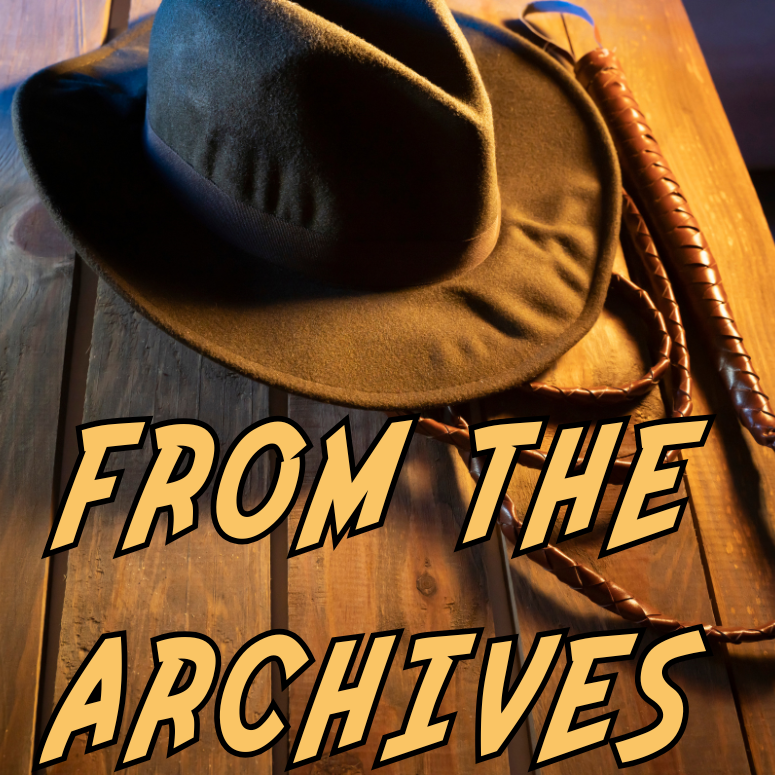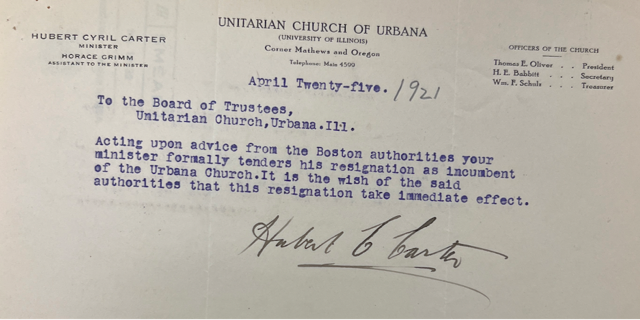From the Archives

5/30/25 Contact Margaret Lovell
Sometimes ministers and congregations just aren’t a good fit. Most churches have probably had one or two of those situations where the philosophies or the personalities or the intentions don’t mesh. Maybe a few members of the congregation have a bone to pick with the pastor but most other folks don’t see the problem. Perhaps the minister’s expectations of the community don’t jibe with the reality of the parish. Most of us probably have a story or two about a mismatch that had to be resolved by grace and earnest conversation or by a parting of the ways.
Nothing I’ve experienced, though, measures up to the experience the Unitarian Church of Urbana (now the Channing-Murray Foundation) had in 1921 with its pastor, Hubert Cyril Carter. Here are some excerpts of letters between Thomas E. Oliver, President of the Church’s Board of Trustees; H.E. Babbitt, Secretary of the Church’s Board of Trustees; Louis C. Cornish, Secretary of the American Unitarian Association (AUA); Minot Simons, Chairman of the AUA’s Department of Church Extension; and Rev. Carter.
OLIVER to SIMONS (March 25, 1921): The upshot of it all is that Carter is dictatorial, egotistical to the most extreme degree. Dear old Professor Forbes who is most cautious in his statements expresses it as ‘monumental egotism.’ Carter cannot take the slightest suggestions in good part. He got into the habit of criticizing every member of the board to every other member. Carter called the parish together, although he must have known that he was far from being in favor, and proceeded to declare that we must look upon him as a permanency, that his policies must have right of way, etc., etc. I do not think that a Catholic priest would talk any differently to his flock. It simply amazed us. I did my level best to conciliate with Carter without sacrificing the dignity of the Board. It could not be done with a man of his tactless and egotistical temperament. Never in my born days have I seen so tactless a man. His is incorrigible. [In a handwritten addendum to the typewritten letter, Oliver says, “Get him away as soon as it can be done!”]
BABBITT (for the Board) to SIMONS (March 30, 1921): The meeting [of the Board of Trustees] was called for the purpose of discussing with Mr. Carter certain policies to be followed and to renew, if possible the accord which had existed between the Board and Mr. Carter but which seemed somewhat strained because of certain incidents. The President reviewed the reasons for the meeting and asked Mr. Carter if there was anything said to which he could not agree. Mr. Carter refused to answer until, he said, “the complete indictment had been presented; that even a prisoner in the dock must hear the complete indictment.” The President said no such thing as an indictment was intended. [An acrimonious exchange followed.] Mr. Carter called for the following statement to be entered into the record verbatim: “In regard to subsequent matters, your pastor feels that an entry into a discussion on matters so petty as illustrated in the letter forwarded to him cannot be made by him in all honor without opening himself up to condemnation. He cannot answer in detail such small and trivial matters. I am perfectly sure that in view of the unfortunate history of this church which was the legacy bequeathed to the present incumbent, in view of the unseemly body of petty criticism which has been accumulated and poured upon his unfortunate head, he feels for the good of all concerned that it were better that our relationship be severed at such hour as shall be convenient to the Boston headquarters.”
CORNISH to OLIVER (April 2, 1921): I think I can see some of the difficulties of the situation which even your full statement to Simons to not explicitly show. You have an Englishman of Methodist training in a wholly independent and intelligent group of people in you church. He has much to learn of our congregational habit. Yet I wonder if the situation has really reached the extreme end of the road? Here is a man of good ability, marked peculiarities, if you will, but unquestioned character. Cannot you and the other members of the Board at your church train him into the kind of minister you want? You remember John Cookson of the Arlington Street Church and later of Plymouth; he was decidedly belligerent. He loved to dispute better than to eat his dinner, and his power of invective left nothing to be desired, but his memory is a tremendous power in Plymouth today, and he was a man of great strength, particularly in the pulpit. I am inclined to think that Mr. Carter has a good deal of Cookson’s power.


